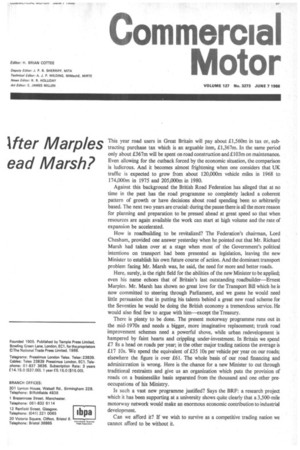ifter Marples ead Marsh?
Page 39

If you've noticed an error in this article please click here to report it so we can fix it.
This year road users in Great Britain will pay about £1,560m in tax or, subtracting purchase tax which is an arguable item, £1,367m. In the same period only about £367m will be spent on road construction and £103m on maintenance. Even allowing for the cutback forced by the economic situation, the comparison is ludicrous. And it becomes almost frightening when one considers that UK traffic is expected to grow from about 120,000m vehicle miles in 1968 to 174,000m in 1975 and 205,000m in 1980.
Against this background the British Road Federation has alleged that at no time in the past has the road programme so completely lacked a coherent pattern of growth or have decisions about road spending been so arbitrarily based. The next two years are crucial: during the pause there is all the more reason for planning and preparation to be pressed ahead at great speed so that when resources are again available the work can start at high volume and the rate of expansion be accelerated.
How is roadbuilding to be revitalized? The Federation's chairman, Lord Chesham, provided one answer yesterday when he pointed out that Mr. Richard Marsh had taken over at a stage when most of the Government's political intentions on transport had been presented as legislation, leaving the new Minister to establish his own future course of action. And the dominant transport problem facing Mr. Marsh was, he said, the need for more and better roads.
Here, surely, is the right field for the abilities of the new Minister to be applied; even his name echoes that of Britain's last outstanding roadbuilder—Ernest Marples. Mr. Marsh has shown no great love for the Transport Bill which he is now committed to steering through Parliament, and we guess he would need little persuasion that in putting his talents behind a great new road scheme for the Seventies he would be doing the British economy a tremendous service. He would also find few to argue with him—except the Treasury.
There is plenty to be done. The present motorway programme runs out in the mid-1970s and needs a bigger, more imaginative replacement; trunk road improvement schemes need a powerful shove, while urban redevelopment is hampered by faint hearts and crippling under-investment. In Britain we spend £7 8s a head on roads per year; in the other major trading nations the average is £17 10s. We spend the equivalent of £35 lOs per vehicle per year on our roads; elsewhere the figure is over £61. The whole basis of our road financing and administration is wrong. Here is the chance for a new Minister to cut through traditional restraints and give us an organization which puts the provision of roads on a businesslike basis separated from the thousand and one other preoccupations of his Ministry.
Is such a vast new programme justified? Says the BRF: a research project which it has been supporting at a university shows quite clearly that a 3,500-mile motorway network would make an enormous economic contribution to industrial development.
Can we afford it? If we wish to survive as a competitive trading nation we cannot afford to be without it.
















































































































































